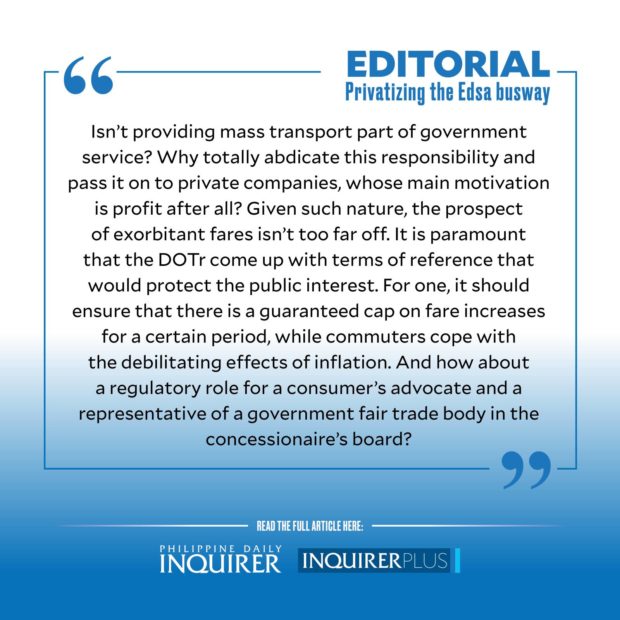If the air traffic fiasco on New Year’s Day were any indication, the country’s transport sector is long overdue for drastic reforms that would offer much-needed relief to exhausted commuters and motorists. But is privatizing the Edsa busway the answer?
Department of Transportation (DOTr) Secretary Jaime Bautista last month announced that starting the first half of this year, the agency will be accepting bids for private parties to take over the operation of the Edsa busway, also known as the bus carousel, on Metro Manila’s busiest thoroughfare.
Launched in June 2020, the bus carousel was meant to augment the shortage in train capacity due to transport restrictions imposed at the height of the pandemic. While passengers initially paid for their fares, the government started offering free rides in November 2020, until Dec. 31, 2022.
With the Department of Budget and Management describing the “Libreng Sakay” program as not included in the 2023 National Expenditure Program of President Marcos Jr., and subsequently disapproving the P12-billion budget proposed by the DOTr to continue the free ride program in 2023, the participating buses in the carousel began charging fares starting Jan. 1. The fares now range from about P46 to P52 for the entire route starting in Monumento, Caloocan, to the Parañaque Integrated Terminal Exchange. The busway system serves an average of 389,579 passengers daily.
In a statement in December, the DOTr said privatizing the busway was part of the Philippine Development Plan 2023-2028, whose priority includes “the expansion and improvement of the country’s transportation system to be safe, convenient, accessible, modern, and efficient.”
“The Edsa busway must conform to international standards,” Bautista said, adding that the government was open to “unsolicited proposals” for a concession agreement that would include the operation and maintenance of the bus stations and the construction of additional infrastructure, if needed. Innovations such as an automated fare collection system could also be introduced, he said.
At least 30 organizations comprising different business groups, trade unions, and private sector associations have so far backed the privatization plan, describing it as “an opportunity for the government to upgrade the country’s public transportation system, despite the challenges posed by severe fiscal constraints brought [about] by the pandemic.” The groups’ joint letter added that it was “high time [for] the government and the private sector [to] join hands to … finally put an end to the daily scenario in which thousands of commuters wait in long queues in overcrowded stations, while enduring unnecessary pains and hardship.”
But reservations about the proposal have been expressed as well, with Alliance of Concerned Teachers party list Rep. France Castro warning that “the planned privatization of the Edsa bus carousel would be another burden to commuters [as] it would mean higher bus fares.” Indeed, isn’t providing mass transport part of government service? Why totally abdicate this responsibility and pass it on to private companies, whose main motivation is profit after all? Given such nature, the prospect of exorbitant fares isn’t too far off. It is paramount that the DOTr come up with terms of reference that would protect the public interest. For one, it should ensure that there is a guaranteed cap on fare increases for a certain period, while commuters cope with the debilitating effects of inflation. And how about a regulatory role for a consumer’s advocate and a representative of a government fair trade body in the concessionaire’s board?
The DOTr must also be held to its promise to give bikers and pedestrians the “highest priority” among road users, with the government building them dedicated and safer bike lanes and wider sidewalks in the next six years. With bikes becoming popular amid the lack of viable mass transport during the pandemic, the increase in the number of road accidents involving bikers in the metro has become alarming, with an average of 26 cyclists killed yearly from 2017 to 2021.
The DOTr said it intended to build another 234 kilometers of bike lanes across eight regions, construct speed tables (midblock traffic calming devices), and a bike bridge, and develop a bike share system.
Just as crucial is ensuring, for national security and economic reasons, that public utilities remain firmly in Filipino hands. Which means that a more critical eye must be cast on Republic Act No. 11659 or “An Act Amending Commonwealth Act No. 146, Otherwise Known as the Public Service Act,” as amended and signed by former president Duterte on March 21, 2022. This measure allows up to 100 percent foreign ownership of public services in the country, including public utility vehicles and seaports. While privatization could lead to better services, the government must ensure that there is no room for abuses that could harm public interest down the road.


